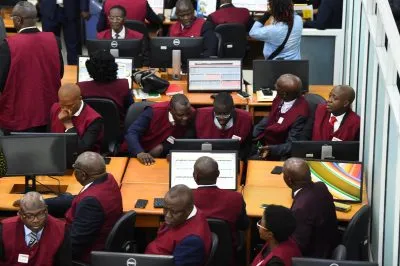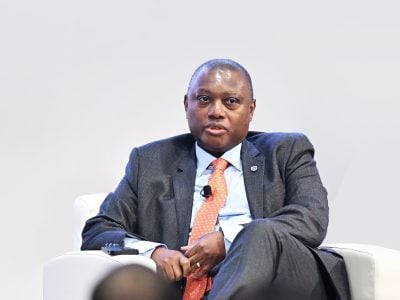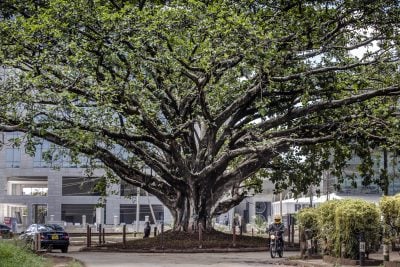In August, a Federal High Court in Abuja granted the Central Bank of Nigeria (CBN) an order to freeze the accounts of several Nigerian investment-tech companies for six months pending a CBN investigation.
The CBN alleged that Rise Vest Technologies Limited, Bamboo Systems Technology Limited, Chaka Technologies Limited and Trove Technologies Limited were complicit in operating without licences as asset management companies “and utilising FX sourced from the Nigerian FX market for purchasing foreign bonds/shares in contravention of the CBN circular referenced TED/FEM/FPC/GEN/01/012, dated July 01, 2015”.
According to a report from Premium Times, Bamboo was accused by the CBN of actively engaging in “trading in foreign securities using FX sourced from illegal FX operators and [the] Nigerian FX market”.
Bamboo declined an invitation to comment to African Business directly about the allegation, but its co-founder Yanmo Omorogbe spoke to us about a number of issues (see below).
In September, Bamboo resumed operations after the Federal High Court in Abuja issued a temporary reprieve. The case has reportedly been adjourned by the sitting judge until February 2022.
“An order is hereby made varying the freezing order of this court made on August 17, as it affects the 2nd and 3rd respondents. This is to allow the companies to pay rent on the property they are occupying, pay salaries of workers and allow for an amicable settlement,” said Justice Ahmed Mohammed, according to Business AM.
Bamboo said that customer transactions had not been affected during the freezing process.
“Even when our accounts were temporarily frozen, customers have always been able to transact on our platform – make deposits, withdrawals, etc. During this period, our biggest priority has been transparent communication. We always wanted our customers to know that their investments and monies were safe with us,” said a statement from the firm.
A gap in the market
In 2018 would-be investors Yanmo Omorogbe and Richmond Bassey were looking for Nigerian companies that could help them invest in the US stock market, but found that the task was far from simple.
Bassey tried to open an international account via a Nigerian broker, but was told he would have to wait three weeks because the person who handled such business was away on leave. Noticing an opportunity, the partners co-founded the Bamboo Investment app to provide a solution to the paucity of access to foreign investments.
“We got talking around the same time and I found out that we were having the same problems. He started doing research and I told him I was interested. We kept talking, kept in touch and we became co-founders and launched in 2019. The rest is history,” says Omorogbe.
“Within five to ten minutes you can open a US brokerage account, make a deposit and get investing and trading the US stock market within a day or two. We have made it easy, secure and fast,” she says.
It has historically been difficult for many retail investors in Africa, and particularly Nigeria, to invest their money safely in foreign markets. In a landscape fraught with Ponzi schemes and investment frauds, many Nigerians have become highly sceptical of firms offering investment services.
Often, those who fall victim to Ponzi schemes are those in the lower rungs of the economic ladder, typically uninformed about investment principles and in need of quick cash.
Yet Bamboo’s founders believed that a large pool of potential retail investors was keen to diversify their portfolio beyond the domestic market. The founders say that reassuring investors about the security of their investments is at the heart of their offering.
Ensuring insurance and security
The firm’s website says that accounts are held by a partner firm registered by the Nigerian Securities and Exchange Commission and a US brokerage partner which is a member of the United States SIPC, which insures each user’s account up to $500,000. The firm says it uses state-of-the-art data encryption when handling financial information as well as two-factor authentication protection.
In a market where many retail investors are unfamiliar with US investing, the firm also puts resources into “educational” marketing materials. It publishes content about the stock market and investing, using Telegram, daily newsletters and YouTube to tutor investors.
“We are initially focused on consumers and users that are online and are able to use our app. I think there is other work to be done around getting more people online but the smart company registration in Africa is quite large already so the work we have to do is convincing people that they can invest using technology safely and securely using their smartphone,” says Omorogbe.
The firm, which has a presence in Lagos and San Francisco, charges users 1.5% commission to buy and sell stocks on the US stock market, and charges users various deposit fees depending on the user payment method. It charges withdrawal fees of N45 to naira bank accounts and $45 to US dollar bank accounts. As well as targeting retail investors directly, Bamboo also offers its services to corporate and institutional clients, including brokers/dealers, fund managers, and investment advisors.
The firm says that investors can currently invest or trade over 3,500 stocks listed on the US stock market or their local exchanges. Yet there are limits on the kind of investments that customers can access through the app.
Customers can mostly only invest in companies with a market capitalisation greater than $1bn – if the capitalisation is below $1bn, its three-month average daily dollar volume must be greater than $0.5m. Trading in penny stocks, options, fixed income, or mutual funds (except money market funds) is currently unavailable.
Responding to the CBN’s challenge
Omorogbe says they operate with the full awareness of the risks involved and have accepted the CBN’s challenge as “a part of doing business”.
With uncertainty over the future of its Nigerian business, Bamboo is targeting expansion into Ghana following customer requests via its social media platforms.
“Every day, we have people asking us when we are launching in Ghana. You know, we see a free market and we want to get into it as a learning curve. Essentially, we will do the same thing we did in Nigeria which is to launch and take a lot of feedback from users, ask a lot of questions. And so we expect that each market will be different but we understand that the motion is the same, which is that everyone is on a quest for yield, to make money and earn returns,” she concludes.
Want to continue reading? Subscribe today.
You've read all your free articles for this month! Subscribe now to enjoy full access to our content.
Digital Monthly
£8.00 / month
Receive full unlimited access to our articles, opinions, podcasts and more.
Digital Yearly
£70.00 / year
Our best value offer - save £26 and gain access to all of our digital content for an entire year!

 Sign in with Google
Sign in with Google 



